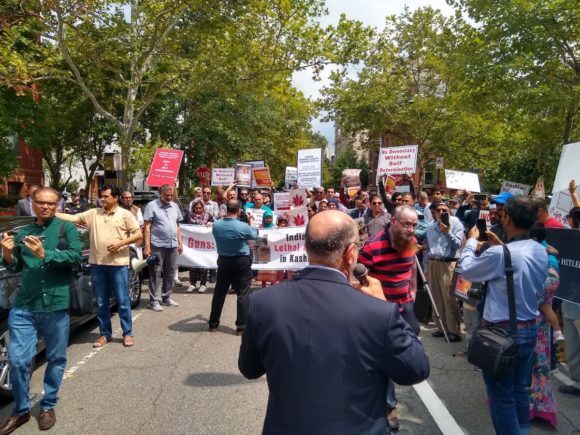India recently revoked Article 370 of their constitution, a provision which gave the Jammu and Kashmir region special status as a self-governing territory. The move strips the region of any autonomy they had, and the Indian government quickly flooded the region with thousands of troops and instituted a communication black out. They cut off internet access and cell service in Kashmir, leaving the fate of the regions 8 million residents in limbo.
This move puts Kashmiri’s in a situation that Palestinians may find familiar. India’s treatment of Kashmir is eerily similar to Israel’s treatment of Palestine, and those that are fighting for Palestinian rights have taken notice.
Activist group American Muslims for Palestine worked alongside the U.S. Council of Muslim Organizations to hold a demonstration for Kashmiri sovereignty in front of the Indian Embassy in Washington D.C. last Friday, showing solidarity for Kashmir.
Taher Herzallah, the Associate Director of Outreach & Grassroots Organizing at AMP, was the main organizer of the event. He has deep roots in Palestinian activism and sprung into action when the Indian government revoked Article 370.
“We are working with our friends in the Kashmiri community to see what plan of action to take next. We figured that a protest in front of the Indian embassy was a good first step,” Herzallah told Mondoweiss about the work AMP is doing, “However, we plan on working with them to do more and hopefully in the coming weeks we will devise a better plan to come up with strategy to approach this issue either in congress or at the UN.”
Herzallah estimates that over 100 people showed up to protest in front of the embassy. There were representatives from all over the Muslim world their, as many outside of the Kashmiri community have decided to take interest in supporting the liberation of Kashmir.
While large demonstrations are one way to raise awareness, they are temporary and make short impact on the awareness of an issue. Herzallah believes that the best way to make a lasting impact is to make the issue of Kashmir a sticking point in the Muslim community, and that those that have sympathies towards Kashmir have a duty to do so.
“The primary role of most people is to engage in the conversation. To spread the word about what’s happening, to learn about what’s happening, and to share with others the main issue at hand, which is the fact that India has been occupying Kashmir for 7 decades and has been engaged in one of the longest military occupations in modern history,” he said.
Herzallah’s also feels that a lot of the tactics that have been successful in raising awareness for Palestine will work for Kashmir too.
“One of the things we have been doing is constant and deliberate engagement within our own community about the issue of Palestine, and that is something you could do as well for Kashmir,” he said, adding that the Muslim community nust “make Kashmir an issue that is of critical importance.”
“It is still a very important issue that we all should be talking about and facing, particularly as a Muslim community that has an actual affinity with the Kashmiri brothers and sisters fighting for liberation,” he said.
Keeping the Muslim community engaged is not the only page on the Palestine playbook that Kashmiri activists can use, though.
BDS has become a key part of the resistance against the Israeli occupation. Trying to hit those that are upholding the occupation where it hurts the most, by punishing them financially for playing a role in the atrocities they are benefitting from. Herzallah believes that a BDS movement could prove successful for Kashmiri’s as well, but it would still require activists to make Kashmir an issue that remains on the conscious of the general public.
“I think there could possibly be a large boycott India movement as long as the atrocities that India is committing in Kashmir are more clear on a regular basis in the media, in the mainstream, in the academic forums and discussions, in community discussions,” Herzallah said, adding that, “the longer it is a salient topic, the more likely people are to take action, and to start asking the questions as to what actions can we take.”
Kashmiri’s may even run into less opposition than Palestinians do, according to the AMP organizer. There is no substantial pro-Indian lobby in the United States like their is a pro-Israel lobby. Many of the allegations of anti-semitism waged against BDS supporters in Palestine can not be waged against Kashmiri BDS supporters. India does not have the infrastructure necessary to combat a legitimate movement against their actions, which could heavily work in favor of the Kashmiri people.
For now, though, Kashmiris and activists have to work on raising awareness of the issue and bringing it to the forefront of the American conscious. As of time of writing, not a single major candidate in the 2020 Presidential election has taken a stance regarding Kashmir yet as the issue has not captured many headlines.
Just like Palestine, the occupation of Kashmir looks like it will be a long, hard, fight for activists.


